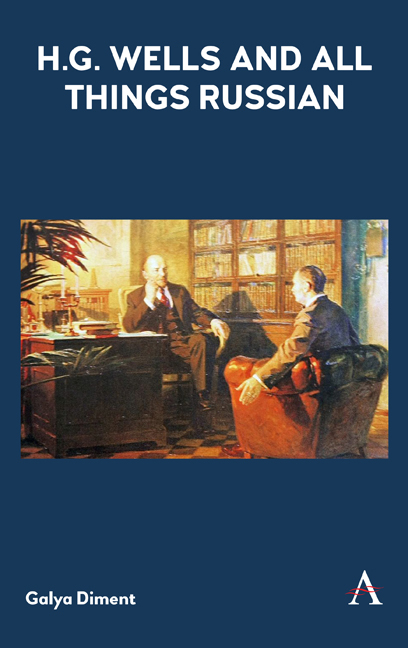Book contents
- Frontmatter
- Dedication
- Contents
- List of Illustrations
- Acknowledgments
- List of Contributors
- A Note on Transliteration
- Introduction: “The Wells Effect”
- Part One WELLS IN RUSSIA: PRE-WORLD WAR II
- Part Two WELLS IN RUSSIA: POST-WORLD WAR II
- Part Three RUSSIA IN WELLS
- Chapter Seven Present Tense Arguments: Russia and H. G. Wells's Babes in the Darkling Wood
- Chapter Eight Wells and Gorky
- Chapter Nine Odette Keun Versus H. G. Wells on Russia
- APPENDIX TRANSLATIONS
- Bibliography
- Wells, Herbert George – Works Index
- General Index
Chapter Seven - Present Tense Arguments: Russia and H. G. Wells's Babes in the Darkling Wood
from Part Three - RUSSIA IN WELLS
Published online by Cambridge University Press: 06 September 2019
- Frontmatter
- Dedication
- Contents
- List of Illustrations
- Acknowledgments
- List of Contributors
- A Note on Transliteration
- Introduction: “The Wells Effect”
- Part One WELLS IN RUSSIA: PRE-WORLD WAR II
- Part Two WELLS IN RUSSIA: POST-WORLD WAR II
- Part Three RUSSIA IN WELLS
- Chapter Seven Present Tense Arguments: Russia and H. G. Wells's Babes in the Darkling Wood
- Chapter Eight Wells and Gorky
- Chapter Nine Odette Keun Versus H. G. Wells on Russia
- APPENDIX TRANSLATIONS
- Bibliography
- Wells, Herbert George – Works Index
- General Index
Summary
Faces along the bar
Cling to their average day:
The lights must never go out,
The music must always play,
All the conventions conspire
To make this fort assume
The furniture of home;
Lest we should see where we are,
Lost in a haunted wood,
Children afraid of the night
Who have never been happy or good.
— W. H. Auden, ‘September 1, 1939’The ur-text for Wells's novel Babes in the Darkling Wood (1940) is a ballad that dates from the sixteenth century. Its account of a world full of hateful cruelty and short on common decency opens with two small children who are about to become orphans. Their wicked uncle plots to kill them, but the men he hires to do the deed cannot go through with it. Lost in a forest, the children wander aimlessly until they lie down, put their arms around each other, and go to sleep. There they are in the morning, dead of exposure. On a quintessentially creepy note, a robin has covered their bodies with leaves. The Mother Goose rhyme that retells this story pulls no punches either. In both versions, the children die and the uncle ends up rotting in a richly deserved prison. The sense that the natural world itself is somehow inimical to human survival informs these poems.
Randolph Caldecott's 1879 illustrated version of the ballad enthusiastically took on the task of terrifying successive generations of children. Caldecott's illustrations are stunning, brilliant, unforgettable, but there is a weird disconnect between the gorgeous animated images and the story's malevolent cast, between the fussy little authority figures lying in their sick bed and their children being taken off to certain death. The horses are too cute to carry them away, these kids too ‘full colour’ to die. And there is a sort of sick fascination at work in this depiction of infanticide: watching a murderer preparing to slip a shiv into the ribs of a struggling six-year-old is not exactly like looking on in horror at Abraham's offering up Isaac as a sacrifice. It is not until Walt Disney's 1932 animated film on the subject that we get a break in the gloom, a story replete with helpful elves and a happy ending.
- Type
- Chapter
- Information
- H. G. Wells and All Things Russian , pp. 131 - 142Publisher: Anthem PressPrint publication year: 2019



